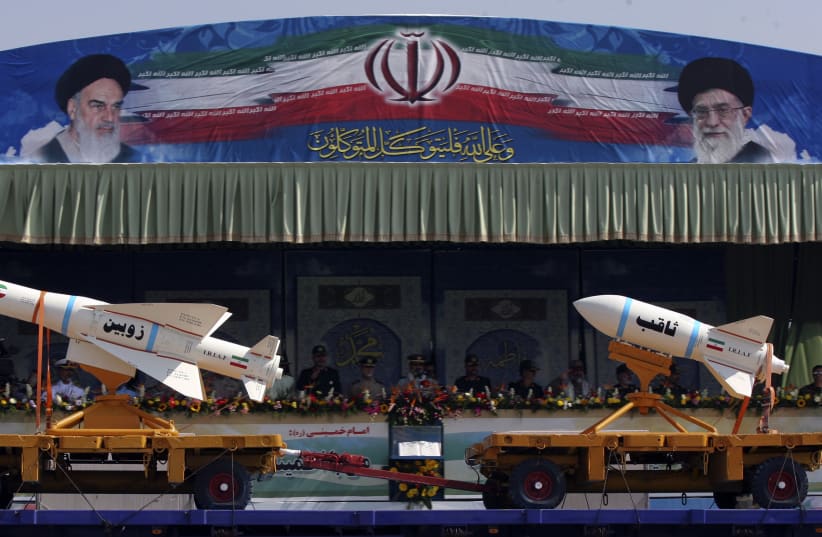What world will we live in after July 7, when Iran’s 60-day deadline for the world to help it improve its economic situation lapses?
Some of Israel’s highest-ranking and smartest current and former intelligence officials analyzed the issue on Wednesday at the Israel Intelligence and Heritage Commemoration Center (IIHCC) conference in Tel Aviv.
What is the cumulative view of hundreds of years of intelligence experience between the many officials who appeared?
First, it appears that the world will fail to meet the Islamic republic’s demands.
The EU is – or at least European businesses are – intimidated from violating US sanctions, even as their governments have tried to get them to continue business with Iran using the INSTEX special finance vehicle for circumventing the sanctions.
While some expect China to flirt with violating the sanctions – and there have been some signs of this – there have been indications that Beijing cares more about resolving its broad trade dispute with the US than it does about helping out Tehran at this time.
There are some other countries also in play, like Russia, India and Turkey, but broadly speaking, even supporters of the 2015 nuclear deal are pessimistic that Iran’s demands will be met.
The question debated heavily then was whether Iran would leave the deal and try to dash toward a nuclear weapon in six to 12 months, or whether it might finally consider a new deal including some of the terms that the Trump administration is seeking.
There was no consensus about what Tehran will do, but there were strong arguments to prove that neither of those two scenarios would transpire.
On one hand, top intelligence officials said that the Islamic republic has taken too hard a stand to back down and completely give in to the Trump administration.
Officials also noted that the Iranians do not view negotiations as a way out, mentioning the Libya example to show what happens to those who give away their nuclear storehouses for US promises.
Libya’s Muammar Gaddafi gave away his entire nuclear program for assurances from the US of better treatment and non-aggression.
Though the US kept this deal for a few years under the Bush administration, when the Obama administration took over and Gaddafi started barrel bombing his opposition, the US helped topple him.
Senior Iranians are not interested in that endgame.
On the other hand, many of the same officials said that the Islamic republic desperately did not want war with the US or others, and would likely avoid violating the nuclear deal in a way that signaled a rush to break out to develop a weapon.
Former senior Mossad and IDF intelligence official Amnon Sofrin passively expressed some frustration with his panelists, whom he repeatedly asked for clear-cut answers and who he said artfully provided characteristically – for intelligence professionals – nuanced responses without taking a clear position.
Perhaps former IDF intelligence analysis chief Brig.-Gen (res.) Yossi Kuperwasser’s comment was most prescient. He remarked that the best Israeli intelligence analysts could not know what Iran really would do, because it is likely that Tehran itself has not yet decided.
In this narrative, the 60-day deadline was a way for Iran to turn up some counter-pressure, while preserving its options to act in a variety of directions.
Iran does tend to prefer the long-game from a sudden major shift.
Sofrin suggested that Iran might simply try to again up the counter-pressure, but do it in a calibrated manner to still preserve its options to escalate or to strategically retreat.
In this light, the IAEA report for May 31 showing no Iranian violations of the nuclear deal should be ignored.
Tehran only announced it was ready to violate limits on its uranium stockpile and heavy water production on May 8, and the report closed as of May 20 – too soon to show if there was a change.
The next report in September will give a much clearer picture about violations.
If the Islamic republic starts to violate the 2015 deal’s nuclear limits, then the devil will be in the details for determining how serious the violation is.
If all Iran does is violate the 300 kg. limit on 3.67% enriched uranium and the 130 metric-ton limit set for heavy water, neither of these violations will immediately make it that much closer to a nuclear bomb.
However, if Iran starts to enrich uranium to the 20% level and restarts work on its heavy water reactor, suddenly the increased volume of uranium and heavy water would be moving it closer to a bomb and at a continually accelerating rate.
So the conference did give some possible guidelines on what to expect from Iran next month, and how to think about the different scenarios.
However, as IIHCC chairman Brig.-Gen. (res.) Zvi Shtauber said as the conference opened, with all of the world’s new big data intelligence gathering abilities, predicting strategic changes and the intentions of complex adversaries can still stump even the intelligence community’s finest.
